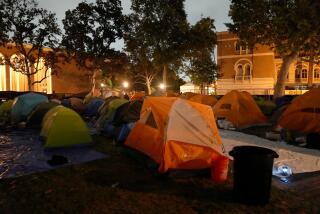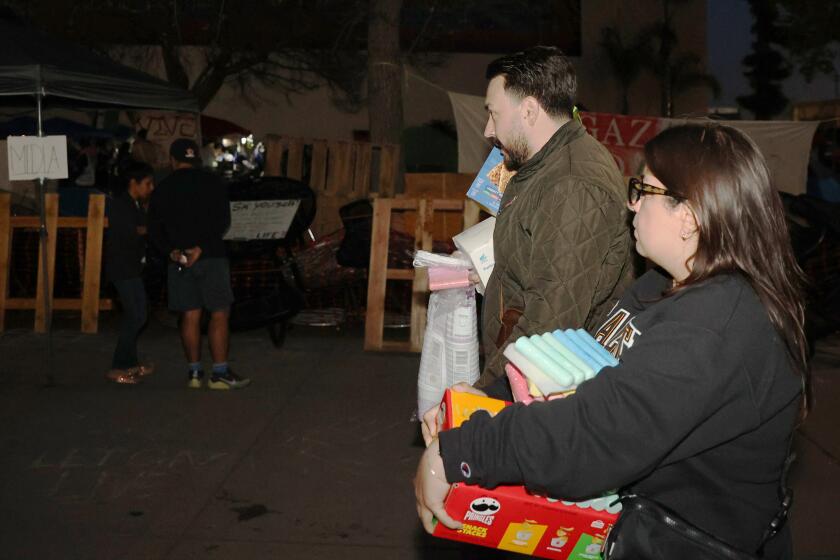Inmate is denied DNA test
A death row inmate will not be allowed a DNA test to determine whether he left biological evidence at a murder scene because the results would have made no difference to the jury that condemned him, the California Supreme Court ruled 5 to 2 Thursday.
In a decision written by Justice Carlos R. Moreno, the state high court said that Charles Keith Richardson had failed to show that a DNA test, even one eliminating him as the source of hairs found where an 11-year-old Tulare County girl was murdered, “could raise a reasonable probability” of overturning his conviction and death sentence. In a companion case, the court also unanimously upheld Richardson’s penalty.
The court’s decision, which interpreted a state law granting DNA requests in defense innocence claims, is likely to deny inmates genetic testing when a trial judge determines there is other, strong evidence of guilt.
In the case before the court, the hairs Richardson wanted tested were the only physical evidence against him. Prosecutors said he admitted guilt to police, although he quickly retracted his statement. His lawyer said Richardson is mentally retarded.
In 1988, April Holley was raped and sodomized, then drowned in a bathtub in the trailer she shared with her mother and sister. A jury in 1992 found Richardson and another man guilty of the murder.
DNA tests on semen recovered from the child excluded Richardson but not his accomplice, who also is on death row. Prosecution experts testified that microscopic analysis showed that some pubic hairs in the tub were consistent with Richardson, but defense experts disagreed.
Since 2004, Richardson has sought to have the hairs tested for DNA with a technology not available at the time of the trial. But the court majority upheld a trial judge’s decision to deny him the test.
“The hair evidence was, at most, simply one piece of evidence tending to show guilt and it was fiercely disputed by the defense to the point that it may well have had little significance in the jury’s determination of guilt or sentence,” Moreno wrote. “By contrast, the evidence that the petitioner was the perpetrator was strong.”
That evidence included statements Richardson made to a witness that he knew the victim was alone on the night of the murder. After the murder, Richardson revealed to police details of the crime not known to the public, the court said.
The court ruled that inmates must show that “in light of all the evidence, there is a reasonable probability -- that is, a reasonable chance and not merely an abstract possibility -- that the defendant would have obtained a more favorable result” if DNA tests had been available.
Richard Jay Moller, Richardson’s lawyer, said he was “mystified” by the court’s decision. He said the prosecution had told the jury that there was a 99.8% chance the hairs belonged to Richardson.
Moller said Richardson has an IQ of about 70 and passed a polygraph in which he admitted witnessing the drowning but denied participating in the crime. The admissions to police were sarcastic, Moller said, and came during a two-hour interrogation.
“All this so-called overwhelming evidence against Richardson is nonsense,” Moller said. “It boggles my mind how they ignored the facts in the case.”
Justice Ming W. Chin, joined by Chief Justice Ronald M. George, dissented from the decision. Chin is considered the scientific expert on the court, and he and George tend to side with prosecutors.
Chin said he agreed that the requested testing, “viewed in isolation,” was unlikely to have changed the outcome of the trial, even if Richardson had been excluded as the source of the hairs. But Chin noted that Richardson also might have be able to present other evidence to bolster his claims.
“This four-year effort [to obtain a DNA test] has undoubtedly been far more expensive -- in terms of monetary costs, passage of time, and expenditure of judicial resources -- than if the hairs simply had been tested four years ago,” Chin wrote.
The hair evidence “played a prominent role at trial,” and that prominence “should have been enough” to warrant a DNA test, Chin said.
Deputy Atty. Gen. Kathleen A. McKenna said “the correct procedure was followed” in the case. But Moller said he would ask the court to reconsider Richardson’s appeal, and pledged to include evidence of Richardson’s retardation in a separate constitutional challenge. Moller said Richardson, who is in his 40s, is severely ill and not likely to live long enough to be executed.
--
More to Read
Start your day right
Sign up for Essential California for news, features and recommendations from the L.A. Times and beyond in your inbox six days a week.
You may occasionally receive promotional content from the Los Angeles Times.







